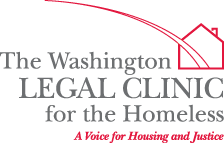For the last few weeks we have been at odds with the Mayor and the Department of Human Services (DHS) over the amendments to the Homeless Services Reform Act that were put into the Budget Support Act (BSA). Our position is that the changes are significant and far-reaching and that the thousands of DC residents who will be affected by them deserve to have their voices heard. Nearly 200 organizations signed on to a letter to the Mayor asking him to withdraw the amendments and introduce them as separate legislation so that the community has an opportunity for input via a public hearing. At the Legal Clinic, we’ve been openly critical of what feels like a very punitive approach to the crisis of family homelessness.
Meanwhile, the Mayor has not agreed to withdraw the amendments. Instead, he has responded that this law is necessary to reduce families’ time in shelter and move them into housing faster, thus clearing the space to serve families year-round. His spokespeople say we’re exaggerating the impact of the changes. We say we’re reading and analyzing the plain language of the proposed law. (For instance, the Mayor says they have no intent to kick people out of housing when they’re in the hospital, but the proposal allows terminations when a resident has left the unit due to “incarceration or institutionalization” for 60 days or more.) They say they don’t really intend to implement it that way, so we shouldn’t worry. We say that laws shouldn’t be dependent on how a current agency staff or the Mayor says they’ll use them —laws needs to be written clearly so that their proper interpretation is not dependent on who is in power.
Then the Mayor escalated the conflict, claiming that the amendments will save DHS $5.3 million and that if the Council doesn’t pass them right away as part of the BSA, DHS will close three shelters for singles on October 1st.
Let’s break this down.
- Are the amendments necessary to move families into rapid rehousing or other housing programs? No. Current law authorizes placements in rapid rehousing and other housing programs, and it even authorizes providers to terminate shelter residents if they turn down more than two offers of appropriate permanent or supportive housing (of which rapid rehousing is a subset). The amendments do not create a guarantee of housing, nor do they remove any of the barriers to rapid rehousing that families assert make the program challenging to benefit from.
- Is authorizing mandatory escrow necessary to allow shelter residents to save money and exit shelter more quickly? No. First, escrow is authorized under current law, it is just voluntary. Very few providers offer it now, but more certainly should, and they don’t need a legal change to do so. Second, escrow will not significantly impact the length of time in shelter. According to DHS, a family’s average length of stay in DC General is three months, nine months for temporary shelters. For families living in shelter between 2007 and 2012, the average monthly income was $430. That means that a family putting 30% of its income into savings would place $129 per month in the account. Not only would that make it difficult to meet the needs of their children each month, but it would take 22 months to save enough for a security deposit and first month’s rent on a two bedroom apartment. That’s significantly longer than the average length of stay for either DC General or temporary shelters.
- Is this provisional placement scheme the key to “preventing long-term shelter” and critical to being able to offer year-round shelter? No. Current law permits DHS to place a family in shelter pending a final eligibility and prioritization decision. In fact, a recent administrative court case held that DHS could even terminate a family from shelter without the right to a prior hearing where the family was determined to be ineligible after placement. The amendments, however, would go much further than this. They would allow DHS to deny due process to a provisionally placed family appealing a regular termination of benefits – e.g., for breaking program rules or failing to cooperate with the assessment process. A family could challenge the decision (for example by proving they didn’t violate program rules), but they’d be on the streets during the appeal period. This is contrary to current law, which ensures families are safely housed or sheltered pending appeal unless there is an allegation of violence. We think the Mayor’s changes would lead to more, not fewer, families on the streets.
- Is there really a fiscal savings from these amendments and will DHS have to close shelters if the amendments are removed from the BSA? No and no. The homeless services budget for FY14 is the same as it was in FY13, and the Mayor is not committing to increasing services by creating a right to shelter for families year-round, nor has he suggested that demand will increase in FY 14. If the Mayor had included a right to shelter or housing in the amendments, he could then argue that he would have a commitment to a higher level of services this year and that commitment would have a certifiable fiscal impact. Not so here. Moreover, Councilmember Jim Graham has committed to introducing the amendments as stand-alone legislation and finalizing the legislation prior to October 1, so even if there were an uncertified fiscal impact, the Councilmember’s commitment negates it. Finally, several of the amendments could cause a negative fiscal impact by cycling singles and families, especially vulnerable populations, out of housing and into more expensive emergency shelters.
We’re in agreement with many of the policies that the Mayor says are motivating these changes. We agree that housing is better than shelter. (In fact, we’re asking the Council to find money to house 300 additional families in FY14.) We agree that families should have access to shelter year-round when they have no safe place to go. (We’d like to see a legal right to shelter or housing.) We agree that shelter is no place for a kid to grow up. (Although it’s certainly better than the street, or an abuser’s home, or a bus station…)
Sadly, we don’t think these amendments accomplish these goals. They have some consequences that we assume were unintended as well. For instance, the proposed law removes the ability of any site-based shelter or supportive housing provider to terminate residents who possess weapons, possess or sell illegal drugs, or assault other residents at the shelter, among other things. (It does this by adding a definition of “provider’s premises” that is limited to “a publicly or privately-owned house or apartment unit in which a client resides and receives a rental subsidy or other services under a shelter or supportive housing program.”) That’s a pretty significant “oops,” one that could have been avoided by having a more open community process.
That’s why the legislative process is so important. We can work these kinks out if given an opportunity. What’s the downside? The Mayor cannot be so entrenched in his position that he is willing to allow a bill to become law that would allow guns, drugs, and violence in shelters with no consequences. If he is, the Council will have to stand up to his pressure and support Councilmember Graham’s efforts to remove the amendments from the BSA and reintroduce it as stand-alone legislation.






0 Visitor Comments
Trackbacks/Pingbacks